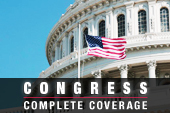The GDP report released late last week showed economic growth slowing to 1.5 percent, and this has raised expectations that the Fed will to do more to help the economy. With more and more signs pointing to a stagnating recovery, additional help from the Fed is certainly needed. But no matter what the Fed does, it cannot solve the economy’s problems on its own. When a recession as severe as the one we’ve just experienced hits the economy, fiscal policy also has an important role to play.
But if fiscal policy is so important, why haven’t fiscal policymakers in Congress done more to help the economy recover? One answer is that Congress is broken, but broken would mean that neither side is making progress on its goals, and that is simply not the case. Through a combination of deliberate policy actions and deficits created by the recession, the Republican’s “Starve the Beast” strategy to reduce the growth of government is working. Federal tax revenues are at a 60 year low as a percentage of GDP, deficits are increasing, government has been contracting at a time when it ought to be expanding to combat the recession, and there is mounting pressure to reduce spending on social insurance programs.
Democrats haven’t lost every battle, the frustration the right feels over Obamacare reflects a fear that the tables might have turned on the push against a larger government, and Democrats may still win a few more yet. But for now, at least, Democrats are clearly losing the broader war that Republicans have waged against government.
This war over the proper role of government helps to explain why Congress has done so little to aid the recovery. Republicans want smaller government, and they have decided the best way to achieve this is to cut taxes whenever they can, especially for those at the top of the income distribution, and strenuously resist any attempt to raise them again. At the same time, spending reductions must be endorsed, even during recessions, especially reductions in social insurance programs such as Social Security.

As Republicans pursue this strategy, at times they might appear to endorse Keynesian type stabilization policy, but it’s only a means to an end. For example, Republicans will promote tax cuts to remedy a recession, which creates a deficit, and then when the economy is healthier argue for spending cuts to bring the budget back into balance. Over time, this type of Keynesian policy – a succession of tax cuts to stimulate the economy followed by spending cuts to balance the budget – will shrink the size of government. That’s the real goal, and their support for Keynesian type tax reduction policies to stimulate the economy is just cover for lowering taxes and reducing government. Republicans don’t, for example, generally support increases in spending as a remedy for recessions.
It’s not that Republicans uniformly believe that Keynesian policies such as an increase in infrastructure spending can’t work. Many Republicans might agree to a temporary spending increase if they could be assured the spending is temporary. The fear is that any and all increases in spending will eventually turn permanent no matter what is promised now, and for this reason all increases in spending must be opposed. That may mean a longer recovery and more unemployment, but the long-run goal of lower taxes and a smaller government must not be compromised in any way.
Similarly, Democrats might be more receptive to using temporary tax cuts to stimulate the economy if they could be assured they are temporary. But once taxes are cut, Republicans will oppose tax increases no matter what and that makes Democrats reluctant to endorse tax cuts as stimulus. In fact, if Democrats want to preserve government programs over the longer haul, they have no choice but to try to pass tax increases when they have the chance even if that means calling for tax increases when the economy is still struggling.
Even Republicans who might be willing to set aside their worries about spending becoming permanent and support, for example, an aggressive infrastructure construction plan cannot do so. The Republican Party will not tolerate any action that puts its long-run goal of lower taxes and a smaller government at risk, and this makes it impossible to form a coalition with Democrats to oppose harmful austerity and instead put temporary fiscal policies in place that could promote a faster recovery.
The unwavering focus from Republicans on tax, deficit, and spending reductions rather than short-run stimulus and job creation serves the interests of the wealthy who fund the campaigns of the Republicans and the centrist Democrats who enable them – they aren’t the ones who need jobs or the services government provides, and tax cuts mean they get an even bigger slice of the pie. But it is bad news for the millions of households still struggling with the recession and hoping to find a decent job sooner rather than later, and is yet another reminder of how wealthy interests have captured the political process.






